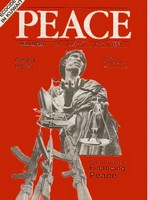
Peace Magazine Jul-Aug 1991, page 25. Some rights reserved.
Search for other articles by John Bacher here
ONE globally important peace group is the War Resisters' International (WRI). Its long time pacifist tactics and aims are gaining greater acceptance and practice, as shown by the Polish Solidarity movement, the ecological pacifist civil disobedience of the Chipko "tree huggers" of India, and the eco-pacifism of the European Greens. The Canadian peace movement could learn much from the non-aligned, holistic approach toward peace taken by the War Resisters' International. David McReynolds, International President, argues that the goal of the peace movement must go "beyond resisting war" to "abolishing the institution of war." What this requires, he predicts, "is a revolutionary break with the past."
The War Resisters League resists what it terms "the Eurocentric approach to disarmament," which makes peace appear "an issue of only a few nations in the West." The Resisters seek to embrace "all of humankind'."
An example of this approach is the WRI's annual Honor Role of Prisoners For Peace. A 1985 Honour Roll included Greenham Common women, Americans imprisoned as draft resisters or for nonviolent direct action against nuclear weapons, and jailed American Indian Movement activist Leonard Peltier.
The release of most imprisoned peace activists from the Eastern bloc before it crumbled shows the importance of such campaigns. Besides members of the Moscow Trust Group, the Eastern half of the War Resisters' Honour Roll included the founder of Independent Initiative, Kiril Popov, in a psychiatric hospital for over three years, and several Polish peace activists.
Securing and extending the rights of conscientious objection is a major objective of WRI. Canadians will be surprised to learn of the limited extent of the rights of conscientious objectors (C.O.s) even in many liberal democracies in Western Europe. Thus in Sweden, WRI notes that some 500 people go to prison annually and are sentenced for refusing military service. Prison sentences are short, generally three to four months, but can be repeated. The WRI's symbol, the broken rifle, had been banned from WRI stationery in West Germany, on the grounds that it "invites people to be C.O.s." In violation of the German constitution, a law was passed making alternative service five months longer than military service. In Greece, C.O.s are sentenced to an average of four years in prison; the only way out is to have two medical opinions that testify to insanity.
Oath refusers conscripted into the Iranian army are often forced to take the oath after being beaten.
The Women's working group of WRI is expanding the scope of conscientious objection to include: war tax refusers; civil servants who refuse to be drawn into civilian preparations for nuclear war; factory workers (such as the Quaker in Ireland who was sacked for refusing to touch military components); and medics who refuse their part of the catastrophe training related to nuclear emergencies. A Belgian affiliate of WRI campaigns for women to declare themselves C.Os. This is to give women the right to refuse tasks with military application or organization. A prominent concern is the right of women on unemployment insurance to refuse work in military industries without losing their eligibility for benefits.
In South Africa, conscientious objection has been a major form of civil disobedience by whites against apartheid. The law requires conscription for all white males except absolute pacifists belonging to a recognized Christian church. Violators of the law can be jailed for six years.
In the Third World, WRI has facilitated links between Argentinean and British activists who hold that neither Britain nor Argentina should have sovereignty over the Falkland Islands. WRI leads the movement against nuclear power and uranium mining in Peru. Its Operation Namibia project smuggled banned books into that occupied nation. Local chapters have also campaigned for detained and disappeared women and have protested military prostitution in the Philippines. It supports the pacifist work of Peace Brigades International, particularly their escort work in Central America.
In Canada, WRI is represented by the Union des Pacifistes du Québec. Although this country is blessed by the absence of compulsory military service, the peace movement should broaden conscientious objection to include the right to refuse military-related civilian work. Peace Brigades International has Canadian volunteers courageously working to protect human rights activists and to discourage violence in Central America. This historic activity is pushing forward the frontiers of the possibility of nonviolent action in the harshest of environments. It deserves the full support of the peace movement.
John Bacher is an Associate Editor with PEACE Magazine.

Peace Magazine Jul-Aug 1991, page 25. Some rights reserved.
Search for other articles by John Bacher here